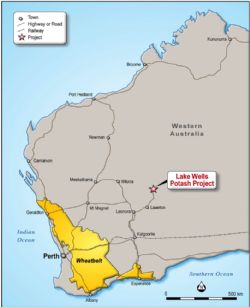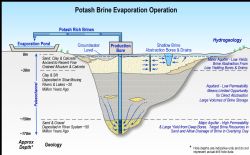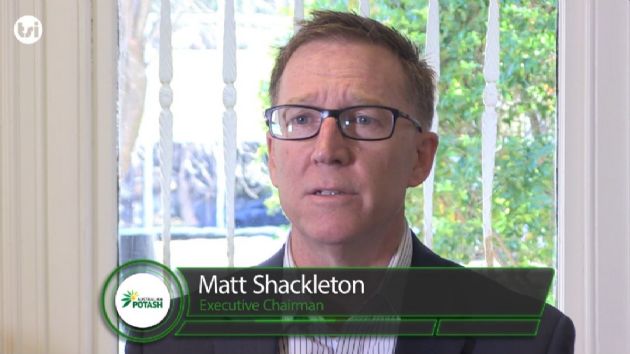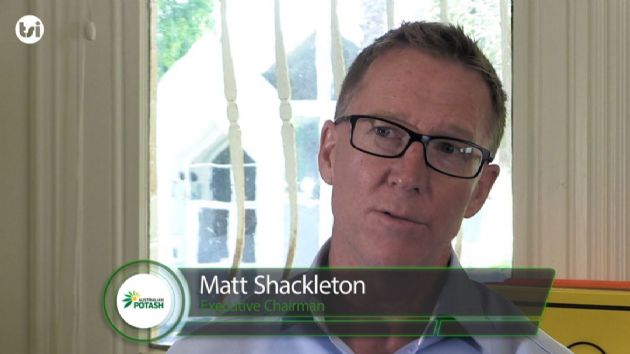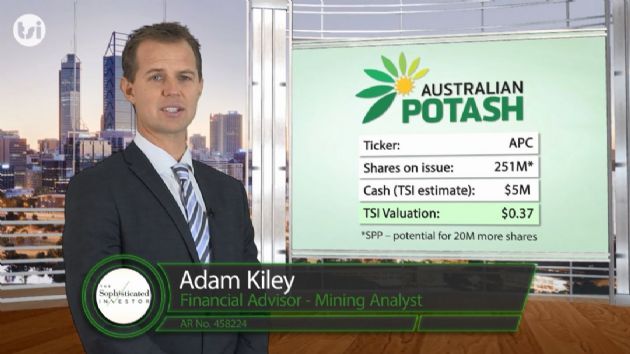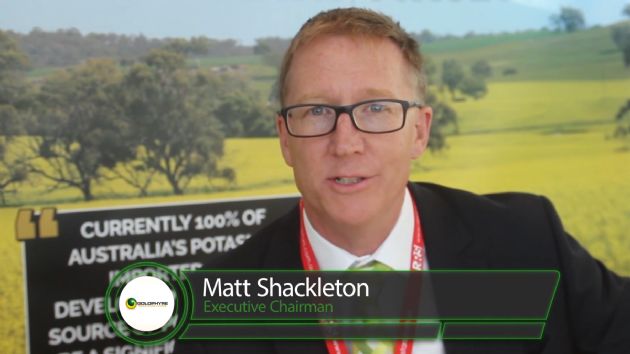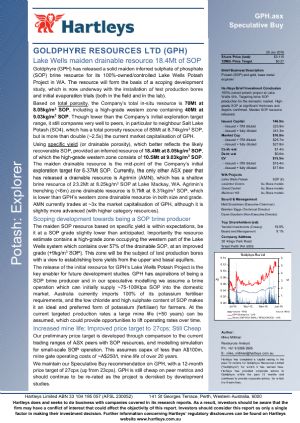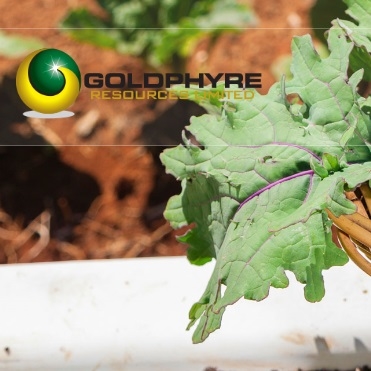
Highly Successful Quarter Puts Maiden Potash Resource on Track for Mid-2016
Perth, April 29, 2016 AEST (ABN Newswire) - Goldphyre Resources Ltd ( ASX:GPH) are pleased to provide the Company's Quarterly Activities Report for March 2016. Due to a highly successful quarter the maiden exploration target released by Goldphyre is in line with the Company's plan to produce 75,000 - 100,000tpa of sulphate of potash.
ASX:GPH) are pleased to provide the Company's Quarterly Activities Report for March 2016. Due to a highly successful quarter the maiden exploration target released by Goldphyre is in line with the Company's plan to produce 75,000 - 100,000tpa of sulphate of potash.
Highlights:
Lake Wells Potash Project
- Exploration Target released:
-- 79 - 123 million tonnes total in-situ Sulphate of Potash at a grade range of 11,400 - 13,900 mg/l (for industry comparison purposes only)
-- Using SPECIFIC YIELD to model the recoverable amount of SOP in compliance with NI43-101, the exploration target becomes
6 - 37 million tonnes Sulphate of Potash at a grade range of between 8,900 mg/l - 13,900 mg/l
- Based on Goldphyre's strategic goal of becoming a 75kT - 100kT per year SOP producer, this represents a significant long mine life for the Lake Wells Potash Project
- Second seismic survey conducted across expanded Project area encompassing the neighbouring Mark Creasy-controlled Lake Wells Exploration Pty Ltd ground doubles the size of the deep palaeovalley hosting the brine potash: further survey results pending
- Drilling program at Lake Wells intersects thicker than expected basal and upper sand layers: sand is significant for a palaeochannel pumping operation as it is highly permeable
- Goldphyre fully funded for resource estimation work program after raising $1.1m in heavily oversubscribed placement
UPCOMING ACTIVITY
- Air-core drilling program continuing with specialist water bore drill contractor: Test production bores planned and test pumping scheduled
- Assay results expected from mid-May through to June
- Maiden mineral resource estimate for release middle of the year
LAKE WELLS POTASH PROJECT
Goldphyre Resources' 100 percent-owned Lake Wells Potash Project is a brine-hosted sulphate of potash (SOP) project located in the Eastern Goldfields region of Western Australia (Figure 1, see link below). Goldphyre aims to supply the Australian domestic demand for SOP. Australia currently imports 100 percent of all potash used, estimated at 500,000 - 600,000 tonnes per annum.
Exploration Target
In March 2016 the Company released an Exploration Target for the Lake Wells Potash Project. The Exploration Target was calculated using both a total porosity factor, to allow for the comparison of it against industry peer' resource estimates, and a drainable porosity factor (referred to as specific yield) to more accurately reflect the potentially recoverable amount of SOP. Total porosity = drainable porosity + un-drainable porosity.
Goldphyre believes it is more relevant to consider the actual potential of the Project to yield SOP, and will report future mineral resource estimates using drainable porosity/specific yield.
The potential quantity and grade of the Exploration Target is conceptual in nature. There has not yet been sufficient exploration to estimate a Mineral Resource and it is uncertain if further exploration will result in the estimation of a Mineral Resource.
Goldphyre is targeting a production operation of 75,000 - 100,000 tonnes per annum of SOP. Figure 2 (see link below) shows how the Company proposes to recover brines from the palaeochannel, using a bore field network. This is a tried and proven brine abstraction technique used in Australia, and is prevalent in many eastern goldfields and Pilbara mining operations as a source of process water. The brines are evaporated, leaving a residue of salts that are harvested and processed into the highly sought after, premium potassium fertiliser, sulphate of potash.
Drilling campaign intersects substantial widths of basal sands Goldphyre conducted a mud-rotary & diamond drilling program at Lake Wells during the quarter, with the aim of testing for the presence of the basal sand unit in the palaeochannel, and confirming previous brine chemistry.
Sand units are relevant to a palaeochannel pumping operation, as they typically have a high drainable porosity. This means it is possible to pump out a high percentage of their contained brines.
The drilling campaign comprised five holes, four of which were drilled to depths exceeding 163 metres. Substantial widths of the permeable basal sand layer, of between 20 and 50 metres, were intersected across the palaeochannel, which augurs well for the conversion of the exploration target to a resource estimate. Four of the five holes were also cased with PVC, meaning they can be pump tested and sampled for potash concentration into the future. The current program of work will see samples submitted for assay from these holes over the next two to three weeks.
Next Steps
The identification of a thick basal sand layer in several deep holes in the latest completed drilling program allows the Company to move to the next stage in its current program of works. This program of works is designed around the progressive measurement of Mineral Resources through to the release of a Measured Resource Estimate in early 2017.
A specialist water bore drilling company has been contracted to complete up to 11 aircore holes to depths of approximately 170m. These holes will be cased with PVC, sampled for brine chemistry analysis, and logged using a down-hole geophysical tool. Data generated from the passive seismic surveys, this pending drill campaign, the drilling recently completed, and drilling completed in July 2015 will underpin the estimate of the Company's maiden Resource Estimate.
The Company has also planned up to four test-production bores using this water bore drilling company. The progression to drilling and commissioning these bores is contingent upon the confirmation of brine chemistry.
Goldphyre is aiming to release its maiden Mineral Resource Estimate for the Lake Wells Potash Project in Q2 2016.
CORPORATE
Goldphyre successfully completed a Placement of shares to professional and sophisticated investors in two tranches at 6.4 cents per share. The first tranche comprised 15.5m shares, raising $992,000. The second tranche was approved by shareholders on 22 April 2016, and comprised 1, 687,500 shares at 6.4c raising $108,000.
A General Meeting of shareholders was held Friday 22 April 2016 at 10:00am at Ground Floor, 20 Kings Park Road, West Perth WA 6005 to consider among other matters the above Placement of shares, and the issue of 29m consideration shares to an entity controlled by Mark Creasy. The issue of these consideration shares settles the transaction through which Goldphyre tripled the size of the Lake Wells project area, and was granted rights to explore and exploit potash on two tenement areas adjoining the existing 100% owned Goldphyre tenure.
To view the complete report, please visit:
http://abnnewswire.net/lnk/655O9R76
About Australian Potash Ltd
Australian Potash Limited (ASX:APC) is an ASX-listed Sulphate of Potash (SOP) developer. The Company holds a 100% interest in the Lake Wells Potash Project located approximately 500kms northeast of Kalgoorlie, in Western Australia's Eastern Goldfields.
Following the release of a Scoping Study in 2017, APC has been conducting a Definitive Feasibility Study (DFS) into the development of the Lake Wells Potash Project. The Company is aiming to release the findings of the DFS in H2 2019.
The Lake Wells Potash Project is a palaeochannel brine hosted sulphate of potash project. Palaeochannel bore fields supply large volumes of brine to many existing mining operations throughout Western Australia, and this technique is a well understood and proven method for extracting brine. APC will use this technically low-risk and commonly used brine extraction model to further develop a bore-field into the palaeochannel hosting the Lake Wells SOP resource.
A Scoping Study on the Lake Wells Potash Project was completed and released on 23 March 2017. The Scoping Study exceeded expectations and confirmed that the Project's economic and technical aspects are all exceptionally strong, and highlights APC's potential to become a significant long-life, low capital and high margin sulphate of potash (SOP) producer.
| ||
|




